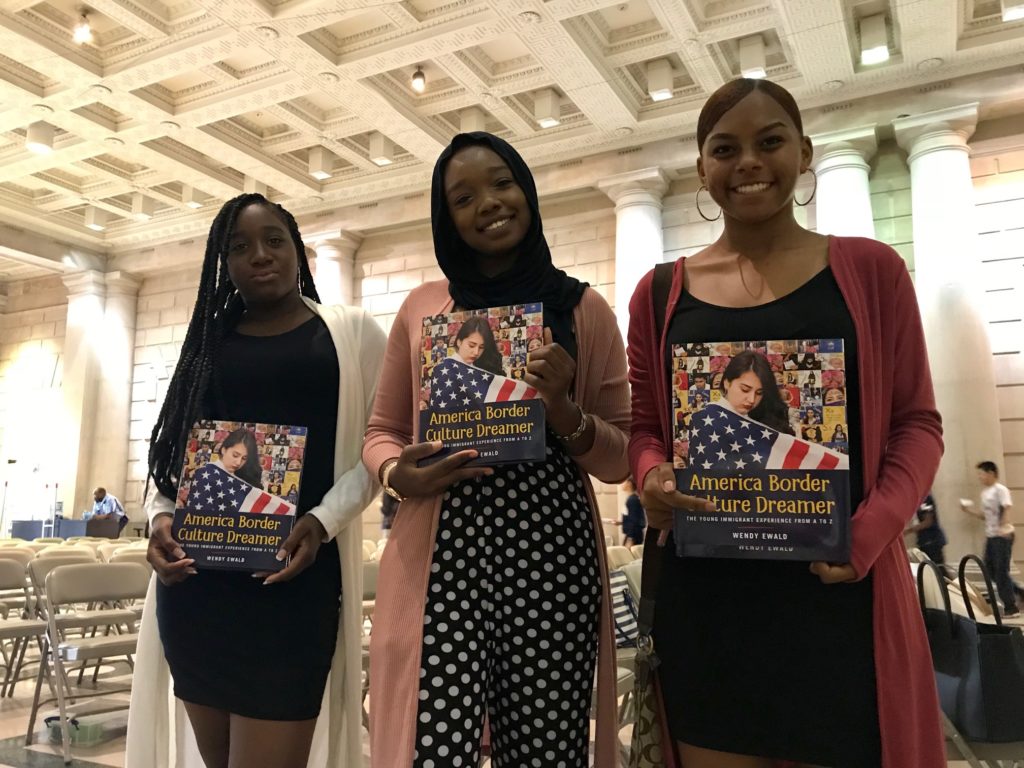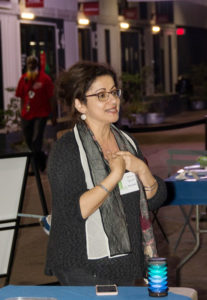Meet Hazami Sayed, immigrant leader and founder of Al-Bustan Seeds of Culture
 June 30, 2019
Category: Featured, Long, People
June 30, 2019
Category: Featured, Long, People
Updates
Updates to photo captions and credits. (7/1/19, 11:35 a.m.)Hazami Sayed founded Al-Bustan Seeds of Culture after 9/11 when, looking at her sons — then 3 and 6 years old — she wondered if she could instill the love of Arabic language and an appreciation of the richness of Arab art and culture in her American boys?
The nonprofit Sayed created is dedicated to presenting and teaching Arab culture through the arts and language, and strives to promote cross-cultural understanding among youth and adults of all ethnic, religious, and socio-economic backgrounds.
Generocity recently conducted a Q&A with Sayed and asked her to share her experience as an immigrant, and as the founder and executive director of a nonprofit in Philadelphia.
Generocity: Can you tell us about yourself and the circumstances of your immigration to the U.S.?
Sayed: I came to the US to pursue higher education. Born in Beirut, Lebanon, I grew up in Kuwait where I attended the American School of Kuwait. While I was raised in a traditional Arab/Muslim household with a Lebanese/Syrian mother, Egyptian father, and three older siblings, I was exposed to American culture early on in the context of my elementary/secondary education and the many expatriates living in Kuwait.
However, when I came as a freshman in college at the age of 18, I still felt a culture shock in many ways. It was a big adjustment and I was fortunate to have my older sister at the same university to help me navigate this transition. As “Americanized” as I felt in those formative years in Kuwait, I came to realize in that first year studying in California how much I wanted to hold on to my Arab roots. I wished that I had applied my Arabic language skills more diligently while in high school so that I could write to my parents a monthly letter with greater Arabic fluency. I longed to read Arabic novels with more ease and pleasure as I had with English literature.
As nagging thoughts lingered about my missed opportunities to fully appreciate the Arabic language while growing up in the Arab region, I continued to find ways to apply myself while living in America. My graduate studies in architecture took me to New York City where I lived for almost 10 years — it’s there that I became a naturalized citizen, holding our first son in my arms as I took the oath of citizenship.
Now a resident of Philadelphia for over 21 years, I find this city has become my home. Although I travel at least once a year to Lebanon to visit family, when I return to Philly I feel a sense of comfort and belonging in ways that straddle the multiple facets of my identity.
Generocity: Tell us a little about the process of founding Al-Bustan.
Sayed: I founded Al-Bustan in 2002. It happened to be after 9/11 and I had left my job working in architecture in order to spend more time with our young boys who were 6 and 3 years old at the time. I was thinking how to raise them as Arabs in America, what does it mean be born here while grounded in Arab culture and the Arabic language. How can they navigate their place and identity in American society in the context of a creative and supportive community while learning Arabic and being immersed in the richness of Arab arts and culture.
That’s how Al-Bustan started: a two-week pilot summer arts camp held in July 2002 at Morris Arboretum of the University of Pennsylvania with 18 campers and a small team of teaching artists and educators. Shortly thereafter we incorporated as a nonprofit in January 2003, and have steadily grown to include year-round arts programming for youth and adults of all backgrounds.
Rooted in Arab arts and language, Al-Bustan offers artistic and educational programming that enriches cross-cultural understanding and celebrates diversity. Our core values embrace the importance of language, role of the arts, artistic quality, and cultural production.
Over the past 17 years the organization has demonstrated success in implementing innovative programs, engaging in three programming areas that complement and inform each other: presenting, teaching, digital education. Commissioning new works and providing forums for the public to experience in-person exemplary arts is complemented by the opportunity for more in depth learning with master artists.
I’m most grateful for the many people who have participated and contributed to the growth of Al-Bustan over the years — to my family, the dedicated staff members, community members, teaching artists, guest artists, board members, funders, and partners who have given so much and enabled us to further our mission in impactful ways — Alf Shukr (a thousand thanks)!
Generocity: When young people look at you and your role at Al-Bustan, what do you want them to identify as the most important characteristics of leadership?
Sayed: I would encourage them to pursue what gives them purpose in life, what allows them to make meaningful contributions to society.
Leadership can be at every level and can take many forms within a small organization, a corporate company, or a civic or political role. In all cases, it requires grit — passion and perseverance with a long view — to continuously think of ways of leading oneself and how to do that purposefully in various contexts at each stage of one’s life.
Generocity: Do you think immigrant nonprofit organization leaders are viewed differently than US-born ones? What are the challenges particular to being an immigrant leader in Philadelphia?
I don’t know of enough examples to reflect on this broadly, but from my personal experiences, it does take extra effort and years to prove oneself and gain the recognition in wider professional circles, though not necessarily just because I’m an immigrant, but more often as a minority seeking to amplify alternative voices and push forward an agenda that is not commonly understood nor given attention in the mainstream.
Generocity: Tell us something Al-Bustan has done that makes you proud.
Sayed: I would like to shine light on “An Immigrant Alphabet” — a collaborative public art project!

Gabrielle, Salawat and Kayla from Northeast High School who participated in An Immigrant Alphabet project at the book launch held on Sept 14, 2018 at The Free Library. (Courtesy photo)
For over 10 years Al-Bustan has had a partnership at Northeast High School — the largest and most ethnically diverse public school in the city. I have been following the work of artist/educator Wendy Ewald since 2003, thinking about a way to invite her for an arts residency.
It took a lot of perseverance to get all the pieces together, from the funding to securing a public space to display the artwork — first at the Municipal Services Building for 11 months, and then at Cherry Street Pier for 7 months.
I learned so much from the youth and how they came to tell stories of their journeys so vividly and poignantly, how the project organically grew with a lot of public exposure over the past two years, and how fortunate we are to have their images and narratives published in the book titled America, Border, Culture, Dreamer: The Young Immigrant Experience from A to Z.
Project
Immigrant Leaders Month 2019Trending News











